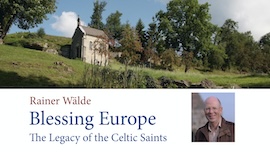Eigil Was Read Aloud Each Year at Fulda

The site of Eigil’s labors remains a Christian center.
WHEN MONK AND ABBOT Eigil died on this day, 15 June 822, he left a well-ordered and prosperous monastery at Fulda in the care of his friend, Rabanus Maurus. Though the church never officially recognized Eigil as a saint, he is usually given the title. One incident stands out to vindicate that claim: his treatment of Ratgar.
Years earlier, Sturm, an associate of Boniface the missionary, had found a place in the wilderness (in the state of Hess in modern Germany) ideal for a monastery. Boniface wrote to Carloman, King of the Franks, on Sturm’s behalf: “We have found a site suitable for monastic life in the wilderness which is called Bochon, near the river Fulda, but this property belongs to you,” he wrote. “I now beg Your Highness to give us this place, so that under your protection we may serve Christ there.” With the king’s permission, Sturm founded the Benedictine monastery at Fulda. Boniface was buried there after his martyrdom, making the place an important pilgrimage site.
Eigil, a nephew of Sturm’s, joined Sturm at Fulda, where he gained respect for his learning and devotion to God. Following Sturm’s death, Baugolf became abbot. He resigned three years later and Ratgar became head of Fulda.
Ratgar was an ambitious man. He wanted Fulda to shine and behaved as a tyrant, forcing heavy building projects on the monks. He seems to have been ruthless, even expelling Eigil because he was too weak to work. The monks endured Ratgar’s tyranny for fifteen years before finally deposing him with the help of King Louis the Pious (Louis I of France). They elected Eigil in Ratgar’s place.
Eigil continued Ratgar’s building projects, but did so with such kindness that the monks loved him. One day, a subdued and repentant Ratgar showed up at the gates of Fulda, asking to be accepted back as a common monk. Eigil not only forgave Ratgar, he used his influence with Louis to obtain permission to readmit Ratgar—the man who had dealt so harshly with him and made the community’s life miserable.
Though his charity to Ratgar was significant, Eigil is chiefly remembered today for his account of the life of his uncle and mentor, Sturm. Filled with authentic information and eyewitness details, the account is a treasure for modern scholars: “I, Eigil, was [Sturm’s] disciple for more than twenty years, and I was brought up and trained in the observance of his monastery from childhood. Some of the events, therefore, which I describe can be vouched for from my own experience.” The monks at Fulda developed a tradition of reading Eigil’s biography of Sturm aloud each year on December 17th, the anniversary of Sturm’s death.
After Eigil’s death, one of his former pupils, Candidus Bruun, performed the same service for him that he had performed for Sturm by writing his biography.
—Dan Graves
----- ------ ------
Waves of Irish and English evangelized Europe. The Irish story is told in Blessing Europe: Legacy of the Celtic Saints. Watch at RedeemTV.
Blessing Europe - Legacy of the Celtic Saints can be purchased at Vision Vdieo







